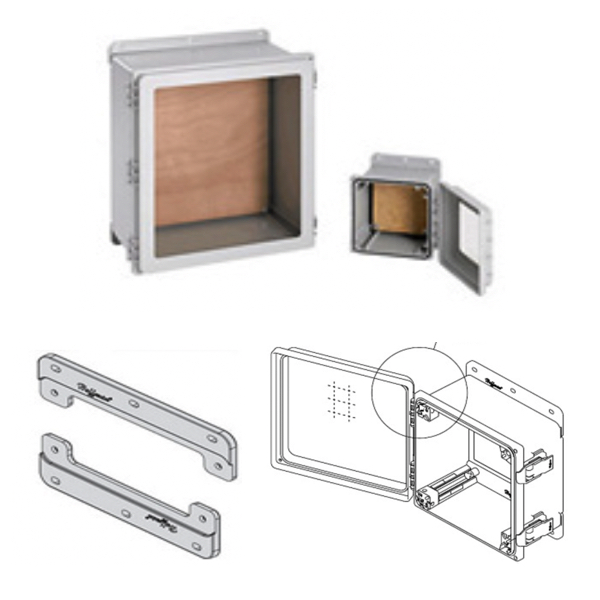POLYPRO Enclosure Accessories

nVent Hoffman POLYPRO enclosure accessories are designed to expand the functionality and installation flexibility of POLYPRO polyester enclosures used in industrial, commercial, and outdoor applications. These accessories support proper mounting, internal layout customization, and secure operation while maintaining the enclosure’s environmental protection and durability in demanding conditions.
POLYPRO enclosures are constructed from high-performance, unfilled thermoplastic polyester produced through injection molding. This material offers excellent resistance to impact, chemicals, moisture, and UV exposure, making it suitable for harsh indoor and outdoor environments. While polyester provides strong environmental sealing and durability across a wide temperature range, accessories such as adjustable panels and mounting kits help ensure proper component placement and long-term system reliability.
Available accessories include mounting bracket kits, adjustable panel kits, hinge retainers, and POLYPRO WiFi cabinets. Mounting bracket kits allow secure wall installation, while adjustable panel kits enable multiple panel configurations with height adjustment using the enclosure’s internal rail system. Hinge retainers prevent cover removal without modifying factory hinges, supporting added security in the field. POLYPRO WiFi enclosures feature RF-transparent polyester construction and wood back panels that allow WiFi and WLAN signals to pass through without signal degradation, making them ideal for wireless networking applications.
FAQs
Q: What are nVent Hoffman POLYPRO enclosure accessories used for?
POLYPRO enclosure accessories are used to support mounting, internal panel configuration, security, and wireless equipment installation within POLYPRO polyester enclosures.
Q: What mounting options are available for POLYPRO enclosures?
Mounting bracket kits are available for wall mounting and are sold in sets that include the necessary hardware for secure enclosure installation.
Q: How do adjustable panel kits work in POLYPRO enclosures?
Adjustable panel kits allow multiple panels to be installed and repositioned vertically using the enclosure’s internal rail system, with height adjustment available within the top portion of the enclosure.
Q: What are hinge retainers used for?
Hinge retainers prevent enclosure cover removal without modifying existing hinges, making them ideal for applications where access control and enclosure security are required.
Q: Are POLYPRO WiFi enclosures suitable for wireless applications?
Yes. POLYPRO WiFi enclosures are designed with polyester construction and wood panels that allow WiFi and WLAN signals to pass through with minimal interference, supporting indoor and outdoor wireless installations.
Why Buy nVent Hoffman POLYPRO Enclosure Accessories from RSP Supply
RSP Supply offers a complete selection of nVent Hoffman POLYPRO enclosure accessories to support reliable enclosure installation and customization. Our product range helps ensure proper mounting, internal organization, and long-term performance in industrial and outdoor environments where non-metallic enclosures are required.

